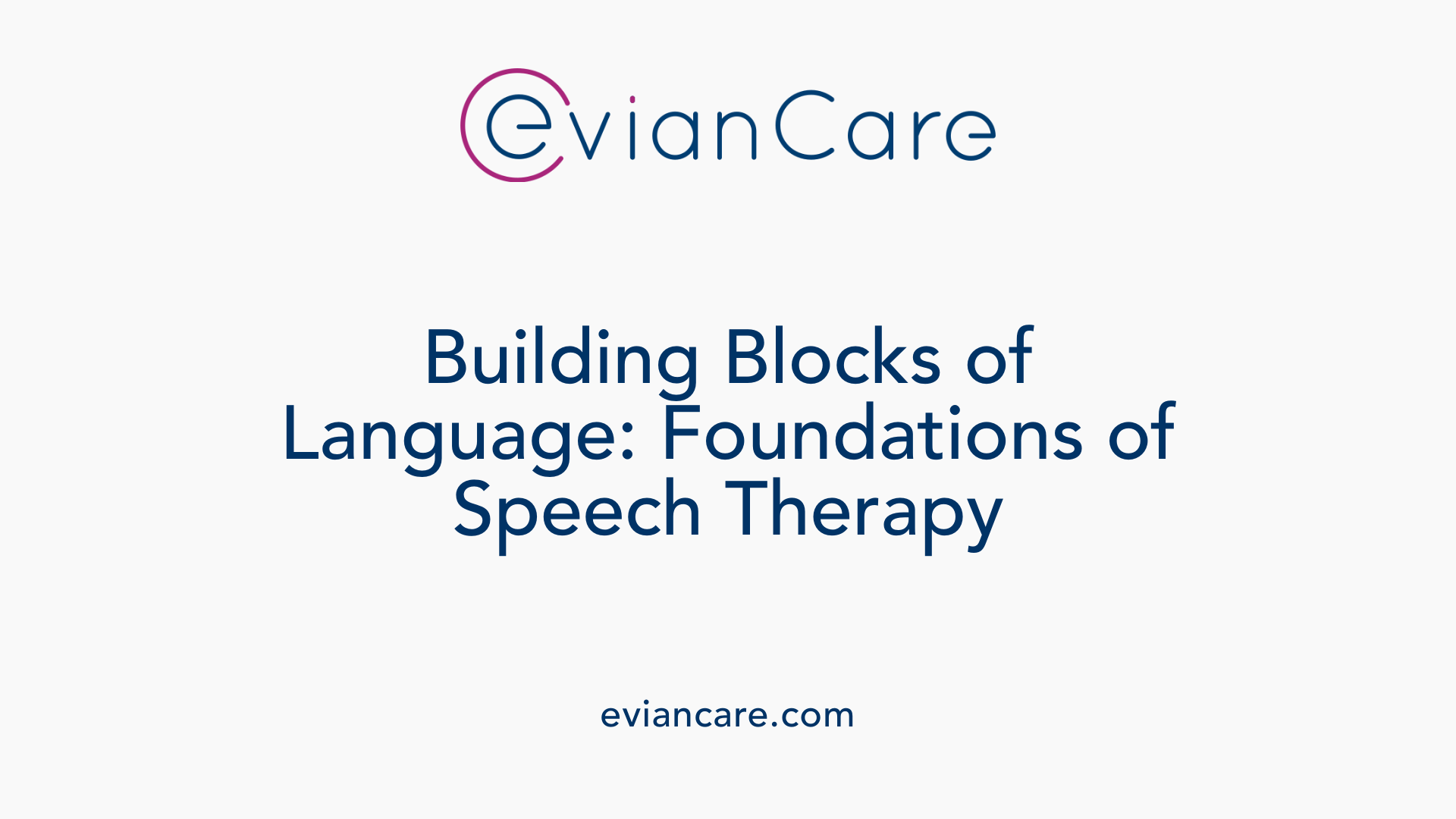
Understanding the Importance of Speech Therapy in Developing Language Comprehension
Speech therapy plays a critical role in supporting children with language comprehension difficulties by addressing underlying communication challenges and fostering essential skills for effective understanding and interaction. Early intervention is vital for maximizing outcomes, helping children overcome barriers to literacy, social engagement, and academic success.
Foundations of Speech Therapy and Its Role in Language Development

How Does Speech Therapy Support the Development of Phonological Awareness, Vocabulary, Grammar, and Sentence Structure?
Speech therapy plays a crucial role in helping children build essential language skills that serve as the foundation for reading and writing. At the core of this process is phonological awareness—the ability to recognize, analyze, and manipulate sounds within words. Activities such as rhyming, sound segmentation, and blending phonemes target this skill, enabling children to decode words more effectively.
In addition to phonological skills, speech therapy enhances vocabulary growth. Expanding a child's word knowledge allows for better comprehension of texts and more confident expression. Grammar and sentence structure are also addressed through targeted exercises, helping children understand how words fit together to form meaningful sentences.
These combined efforts support a child's overall language comprehension, which is vital for literacy success. By strengthening these foundational skills, speech therapy prepares children for successful reading and writing experiences, setting them on a path to academic achievement.
What Activities Are Used in Speech Therapy to Promote Language and Literacy?
Engaging children in a variety of playful and educational activities is a hallmark of effective speech therapy. Common strategies include:
- Rhyming Games: Encourage recognition of similar sound patterns, boosting phonological awareness.
- Sound Segmentation: Practice splitting words into individual sounds or syllables to improve decoding skills.
- Blending Phonemes: Help children combine sounds to form words, fostering reading fluency.
- Storytelling and Read-Alouds: Develop narrative skills, vocabulary, and comprehension.
- Language-Based Games: Use interactive activities to expand understanding of sentence structure, grammar, and semantics.
These activities not only make therapy engaging but also address multiple language domains simultaneously, reinforcing the skills necessary for literacy.
What Is the Connection Between Speech Therapy and Literacy Development?
Speech therapy and literacy development are intricately linked. Speech-language pathologists (SLPs) assess and treat communication skills that underpin reading and writing abilities. For example, phonological awareness, a primary focus during speech therapy, is essential for decoding words—a foundational reading skill.
SLPs also work on expanding vocabulary, understanding syntax, and enhancing listening comprehension — all important for fluent reading, understanding texts, and effective writing.
Early intervention in speech and language difficulties helps prevent literacy problems from escalating. Through targeted activities like phonological training, story-based comprehension exercises, and instruction in sound-letter correspondence, SLPs support children in acquiring the skills needed for successful literacy.
How Can Speech Therapy Improve a Child's Receptive and Inferential Language Skills?
Speech therapy is effective in enhancing a child's ability to understand and interpret spoken language. For receptive skills, therapy may include activities like following multi-step instructions, listening to stories, and understanding gestures.
To develop inferential skills, children are encouraged to answer 'why' and 'how' questions, make predictions, and draw conclusions based on context. Visual aids, categorization exercises, and storytelling help children grasp subtle meanings and underlying messages.
By practicing these strategies regularly, children learn to process spoken language more efficiently, interpret meaning, and make logical inferences. This comprehensive approach improves everyday communication, social interactions, and academic performance.
| Aspect | Description | Examples |
|---|---|---|
| Phonological Awareness | Recognizing and manipulating sounds | Rhyming, sound segmentation |
| Vocabulary | Understanding and using words | Naming objects, explaining meanings |
| Sentence Structure | Building correct sentences | Grammar exercises, storytelling |
| Listening and Comprehension | Understanding spoken language | Following directions, answering questions |
| Inferential Skills | Drawing conclusions from context | Making predictions, answering 'why' questions |
This table summarizes the essential areas targeted during speech therapy that collectively support a child's literacy journey.
Identifying and Supporting Children with Language Comprehension Challenges

What are signs and symptoms of language comprehension challenges in children?
Children with difficulties in understanding spoken language often display several recognizable signs. They may have trouble interpreting instructions, questions, jokes, or stories correctly. Such children might seem disinterested or withdrawn during conversations, which can be mistaken for behavioral issues. They tend to struggle with following directions, especially multi-step ones, and may miss important details in conversations.
Furthermore, these children might misunderstand gestures or abstract concepts, responding inappropriately or with noticeable delays. Older children may face difficulties grasping complex sentences, figurative language, or reading comprehension. Early signs typically appear before age 4 and include limited understanding of words, gestures, and the ability to follow simple instructions. These communication challenges can significantly impact their social interactions and academic performance, leading to frustration and withdrawal.
Effective Interventions and Strategies in Speech Therapy

What are common speech therapy approaches and interventions for children with language comprehension difficulties?
Children facing challenges with language comprehension benefit from a variety of targeted speech therapy approaches. These typically include activities designed to build vocabulary, help children understand complex sentences, and develop inferential language skills.
Therapists often adopt play-based methods, visual supports, and multisensory exercises to make learning engaging and effective. For example, vocabulary enhancement might involve picture books, flashcards, or storytelling activities that introduce new words in context. Understanding longer or more complex sentences is tackled through exercises that break down sentence structure and encourage repeated practice.
Interventions also focus on improving pragmatic skills, such as initiating conversations, understanding others' perspectives, and following social cues. Family training and modifying the child's environment play an essential role, enabling reinforcement at home.
Activities like following multi-step directions, role-playing scenarios, and playing games such as 'Simon Says' are common. They promote listening skills, attention, and comprehension in a fun, interactive way.
Most approaches are backed by evidence showing positive results, especially when therapy begins early. Incorporating multidisciplinary strategies—such as augmentative and alternative communication (AAC) devices, DIR/Floortime models, and family-centered practices—can further enhance a child's communication abilities.
| Approach | Example Activities | Supporting Details |
|---|---|---|
| Vocabulary Development | Picture books, flashcards | Builds word knowledge critical for understanding spoken language |
| Complex Sentences | Sentence breakdown exercises | Improves comprehension of syntax and structures |
| Inferential Skills | Question generation, story re-reading | Enhances the ability to interpret implicit meaning |
| Environmental Modifications | Parent training, family activities | Creates a communication-rich setting for practice |
Overall, these strategies aim to support children in understanding and interpreting spoken language better, improving their academic and social functioning.
The Impact of Early and Tailored Speech Therapy on Long-Term Success
Early and personalized speech therapy interventions can dramatically improve children’s language comprehension, literacy, and social skills. By focusing on foundational language abilities and using engaging, evidence-based techniques, speech-language pathologists empower children to understand and interact with the world more effectively. Involving families in therapy ensures sustained progress and confidence in everyday communication, setting the stage for academic achievement and lifelong success.
References
- The Connection Between Speech Therapy And Reading Skills
- Childhood Spoken Language Disorders - ASHA
- How Speech Therapy can Help Remediate Reading - TherapyWorks
- Language Comprehension in Children | Brisbane Speech Pathology
- Speech Therapy: What It Is & How It Works
- 7 Signs Your Child May Benefit from Speech Therapy
- How does Speech and Language Affect a Child's Reading?
- The Link Between Speech Therapy and Reading Skills












